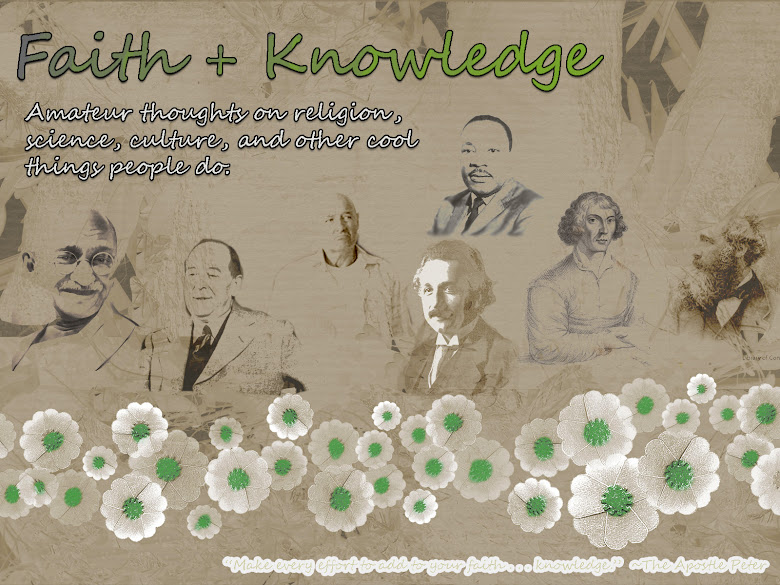"Superficiality is the curse of our age…. The desperate need today is not for a greater number of intelligent people, or gifted people, but for deep people."I've always been intrigued by people who seem to have a lot more going on under the surface than on the surface. I'm sure most reading this will know what I'm talking about. At least I hope you do because I'm not quite sure how to describe it. Sometimes it's a quality that you can somehow sense upon first meeting someone. Other times, you might perceive that a particular person wears everything on their sleeve, until you learn something surprising about them and you second-guess.
-Richard Foster, "Celebration of Discipline"
Regardless of whether it's perceptible immediately or gradually, it eventually comes out. You realize that no matter how many questions you've asked (hometown? degree? job? aspirations? married? kids? dogs or cats? music?), no matter how much Facebook stalking you've done, you've only seen the tip of the iceberg. Whether it's for potential romantic interest or pure friendship, you find yourself compelled to learn more about this person.
There are five things that stick out to me when I pose the question, "How do people cultivate depth in their personality and in their character?" One is that they have deep friendships. This may be counter-intuitive because the kind of person I've been talking about may seem coy, hidden, or mysterious. However, this is not necessarily the case. I think deep people can be any range of introvert or extrovert. The key is that there's just a few people, their closest friends, who they really allow to see inside. They value those friendships more than just about anything else in their lives, and they maintain those friendships over long periods of time, even when things like careers and geography threaten to break them up.
Ironically, solitude is the other side of this coin. Deep people are in the habit of being alone on occasion. When left to themselves, they find enough there. Inside. They are not instantaneously bored in the absence of people and iPhones. They can read, write,watch a movie, eat, think, pray, or any number of other activities all by themselves and be perfectly okay (at least for some limited amount of time, of course. Introverts may naturally enjoy more extended bouts of solitude. The balance is that introverts have more trouble being social, which is also needed for depth. And that leads me to my next point.)
Deep people have a wide variety of friends. Not necessarily a lot of friends, but there is at least some diversity among their friends and acquaintances. Deep people enjoy good conversation. They seek it out. They steer small talk to deeper waters. They want to hear an array of perspectives. They listen attentively, and respond to what others say, rather than simply waiting their turn to interject what they've been wanting to say all along. They well up with the joy of solidarity upon discovering points of mutual agreement, and they very carefully and gently express points of disagreement. They allow their lives to be shaped by people of varying beliefs, worldviews, backgrounds, and ethnicities.
Fourthly, deep people are grounded and stable. They are consistent in their morals and in their ways of living. Of course, that doesn't mean they never change. They develop, grow, and mature in a steady direction. They are regularly looking for ways to become a better man or woman. They have a certain humility about them, believing that they are not the only person in the world with needs. They of course experience pain just like anyone else, but they often recognize that their problems are trivial relative to the sufferings of so many others. They feel a need to minimize the amount of resources they take from others, and maximize the amount they give.
Lastly, deep people have passions. Not just fleeting hobbies and interests, but deep-seated desires to do something great with their talents. They know the value of arts, crafts, and education. They explore various hobbies, and when they find one they love, they stick with it and try to master it.
Oh, and one more brief add-on if I may: this should almost go without saying, but I'm saying it. Deep people don't spill out their entire lives on social networks. If I can go to your Facebook and Twitter and put together a basic outline of everything you did yesterday, including an approximation of your emotional state at each point, you may want to work on playing your cards a little closer to your chest. : ) And I say that in love because I can go overboard myself sometimes. I'm just thinking that if you feel the need to let ALL of your Facebook and Twitter friends know that much about you, what's left on the inside? What is there left that only your closest of friends will discover? What will it say about our personality and character when the tip of the iceberg is all there is? Author Richard Foster wrote that what the world needs most are deep people, and he penned those words long before the advent of social media! If they were true then, they are even truer now.

